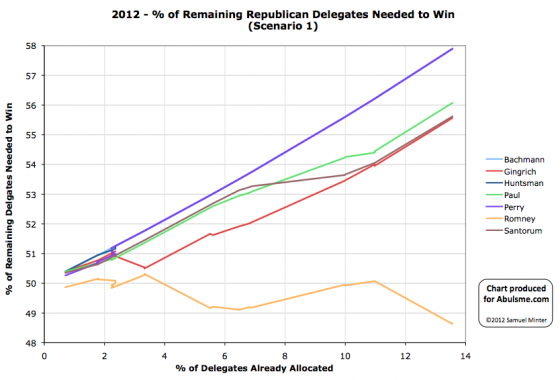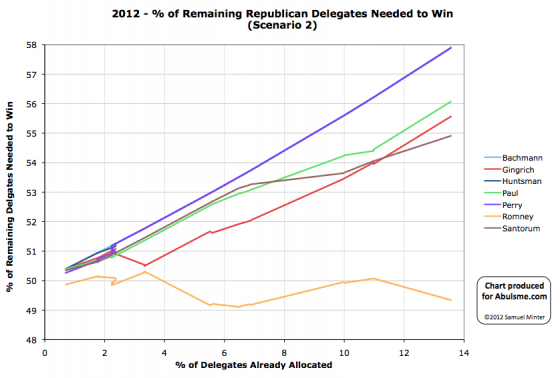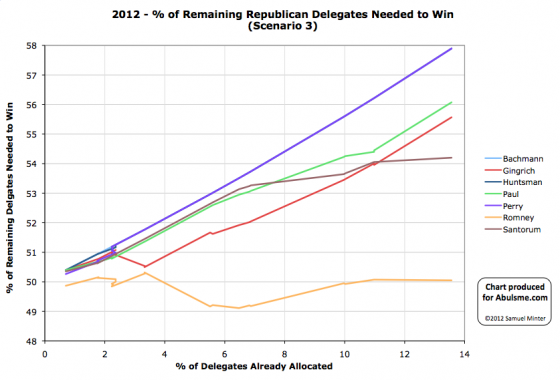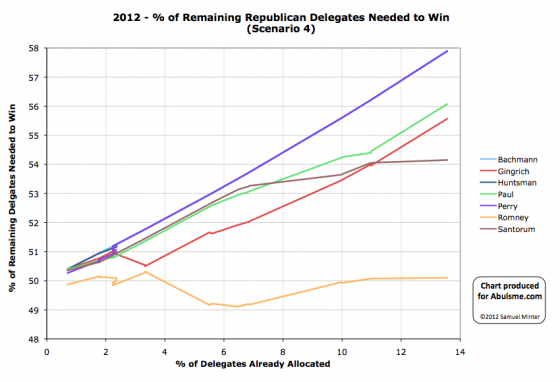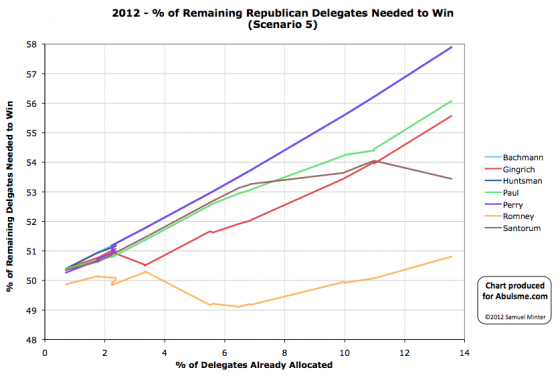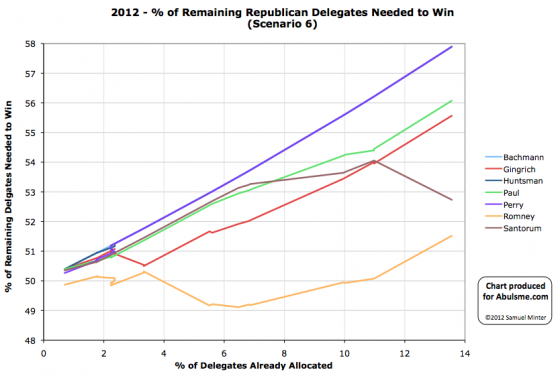- Reading – Cookies and Privacy (John Gruber) http://t.co/BbT2SNs7 #
- Reading – 2012 Republican Delegate Allocation: Wyoming (Josh Putnam) http://t.co/31UUaWoP #
|
OK, we have a couple states coming up in the next week, and a lot has been made about what happens if Santorum wins, etc. Now, a lot of that analysis is based on the momentum Santorum would gain going into Super Tuesday, but lets just look at the delegates for a minute, and see what would happen under various scenarios. First thing to remember for all this is the way the delegates are allocated. Arizona is winner takes all with 29 delegates at stake. Michigan is more complicated. 30 delegates are at stake. A grand total of TWO delegates are determined proportionately based on the state wide primary results. (So these will almost certainly just be 1 each to the top two candidates unless it is a blow out.) The other 28 delegates are allocated winner take all by congressional district. Michigan has 12 congressional districts, each district determines 2 delegates. So in Michigan, the delegate result depends quite a bit on how candidate’s support is distributed geographically, the overall statewide numbers will not tell the whole picture. Second item before we start looking at scenarios… where we are in the polls right now:
And of course the starting point for all this is the current state (as of February 25th) on my Delegate Count page. (Sources and methodology and such explained there.) OK, so now looking at a few possibilities, in order from best for Romney, to best for Santorum. Note that the actual results will not likely exactly match any of these scenarios, but rather these give several types of results that characterize the kinds of outcomes that might happen. Scenario 1 First up, current polling, plus Romney’s support in Michigan is uniform across the whole state, so he wins all of the congressional districts too. Result in this scenario, Romney gets 58 delegates for the night, Santorum gets 1. OK, obviously Romney is the big winner here. He moves down (toward the nomination) significantly. He only needs about 48.6% of the remaining delegates to win. The closest competition would still be Gingrich, although Santorum would only be one delegate behind. Gingrich and Santorum would both need about 55.6% of the remaining delegates to catch up and win. Still not an impossible number if Romney completely collapses, or even if one of them drops out and the other gets all their support (plus a bit). And with some wins in big winner take all states, it could be done. But 55.6% is starting to be a big number. And it is a LOT more than the 14.5% of the delegates these two would have gotten so far. The “catch up and win” possibility gets much further away with this result. And even the “Stop Romney from winning” possibility gets further away, as Romney continues to pile up the delegates. Scenario 2 OK, now lets take current polling, but pretend the results in the various districts is such that the districts divide in about the same way as the popular vote goes between the two top candidates. Essentially in this scenario, Romney and Santorum split Michigan with 15 delegates each. (And Romney still wins Arizona.) So for the night, Romney gets 44 delegates and Santorum gets 15. Please note, and this is important: You get essentially the same result here regardless of who actually wins the state popular vote! As long as it is close, and the candidates essentially split the congressional districts, you get this sort of result. Depending on how many CDs are actually won by each candidate, you move the numbers a little, but the essential result is the same. With this kind of result, the state popular vote bragging rights matter ONLY to the media narrative that will build (and therefore any effects on later contests)… but they do NOT matter to the actual delegate numbers. Romney is still the only winner here. It is clearly not as big a win, but Romney still makes his “% of remaining delegates needed to win” go DOWN, and go down to under 50%. Santorum, despite getting some delegates, is still in a worse position than when he started the night. Before he needed 54.1% of the remaining delegates to catch up and win the nomination, now he needs 54.9%. Santorum does pull ahead of Gingrich though, and put himself clearly into second place. But the three non-Romney’s in this situation are still all heading upward (toward being mathematically eliminated), none of them has started to actually move down toward catching up and winning. Romney in this situation does improve a bit here, but also still isn’t breaking out downward yet. He is still hovering in the zone where his opponents (collectively) only have to do a little bit better to block him from getting the nomination. Note that they do have to do better though. Paul, Gingrich and Santorum could keep getting delegates at the same rate, and Romney would still get the nomination, it would just take awhile. Scenario 3 OK, now lets say Santorum reverses the poll momentum and ends up winning the popular vote in Michigan. As mentioned above, if his support is “lumpy” around the state, and both Romney and Santorum end up getting significant numbers of delegates, then we just have Scenario 2, plus or minus a few delegates depending on exactly how many congressional districts each candidate wins. So for this scenario, lets pretend that Santorum actually wins with his support uniformly distributed across the state and Romney wins no congressional districts. Then we have Santorum getting 29 of the state’s delegates, and Romney getting only 1. So for the night that would make it 30 delegates for Romney, 29 for Santorum. Note that despite Santorum “winning” Michigan, Romney still gets more delegates for the night because of Arizona and the 1 proportional Michigan delegate. Romney is STILL the only actual winner in this situation… although just barely. He goes from needing 50.07% of the remaining delegates to win, to needing 50.05% of the remaining delegates to win. Essentially he is flat. Santorum, despite winning Michigan in a pretty convincing way, is still worse off than coming into the day. Going in he needed 54.1% of the remaining delegates to win, now he needs 54.2% of the remaining delegates. But essentially this is flat. Once again though, Santorum does pull head of Gingrich (by an even bigger margin than Scenario 2 of course) and plants himself solidly in second place. (Although still quite a long ways back from Romney). This scenario does however keep Romney hovering around the 50% of remaining delegates needed to win line, while having gotten just 50% of the delegates so far. This is the path to getting 1144 at the last possible moment before the convention. Obviously Romney would like to do a bit better than that as just the slightest misstep at this rate of delegate collection could cause him to end up just short of the magic number. Scenario 4 OK, now lets imagine that Santorum comes back from behind unexpectedly in Arizona, but at the same time Romney consolidates Michigan and wins there in every congressional district. Since this involves momentum going in different directions in different states, this seems unlikely, but lets include it for completeness. In this scenario EVERYBODY LOSES. Nobody gets enough delegates to actually be on a pace to win the nomination. Santorum does pull ahead of Gingrich, so there is that. And he does win the night. But just barely. And not by quite enough to actually be catching up fast enough to get to 1144. Scenario 5 Romney and Santorum split Michigan (either might win the popular vote, but they split the congressional districts), but Santorum does a come from behind victory in Arizona. So for the night we get 44 delegates for Santorum and 15 for Romney. We now for the first time have a situation where Santorum actually clearly wins the night. His “% of remaining delegates needed to win” actually drops… from 54.1% down to 53.4% of the remaining delegates. Meanwhile, Romney gets knocked backwards. Rather than needing just 50.1% of the remaining delegates he now needs 50.8%. Now, Romney is still in the lead here, and by a decent margin, but with a result like this for the first time since Gingrich won South Carolina, someone would actually be improving their position in the race versus Romney. Scenario 6 Once again we imagine the Santorum upset in Arizona, but this time combine it with the widespread win in all Michigan congressional districts. This is Santorum’s dream scenario. Here he gets 58 delegates for the night compared to only 1 for Romney. Here Santorum wins the night decisively. After a night like this, Romney would still be ahead, but would be back below 50% of the delegates allocated so far and he would actually be moving quickly away from the nomination rather than closer to it, and Santorum would be gaining at an alarming rate. Of course, winning a winner take all state, plus almost all of the delegates from another state will do that. Romney would be in deep trouble in this scenario and while sell behind, Santorum would now be nipping at his heels. Conclusion All the hype is about Michigan because it is close. And because a Santorum win there will get everybody excited about “momentum”. And indeed, that kind of victory followed by the media frenzy that followed, could indeed move poll numbers in the subsequent states, most critically the Super Tuesday states… But in terms of where the delegate race stands today, Michigan is not enough. For Santorum to actually get a substantive victory on Tuesday, not just one that he hopes will lead to bigger victories down the line, then he HAS to win Arizona too. The only situations where Santorum is actually on a pace to win the nomination himself are ones where he wins Arizona as well as a substantial number of the congressional districts in Michigan. Even with a widespread win in Michigan where Santorum wins all 14 congressional districts, if he loses Arizona, then Romney still gets more delegates for the night, and Santorum isn’t on a pace to catch up. Of all the scenarios above, my best guess is that we will be closest to Scenario 2 than anything else. Which would mean that regardless of the state wide popular vote winner, Santorum and Romney split the Michigan delegates, and Romney wins Arizona. Which is a win for Romney in the delegate race, and by a decent margin. Of course, if Santorum does win Michigan’s overall state popular vote, expect all the talk to be about that and the momentum he gets out of it. We won’t hear much about how actually Romney is closer to the nomination than he was before, even despite the Michigan result. If Santorum does pull off a surprise in Arizona though… well, that is a completely different story. Edit 2012 Feb 26 16:02 UTC for minor wording clarification. Edit 2012 Fev 29 14L57 UTC to fix typo. |
||
